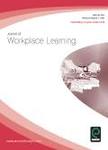版权所有:内蒙古大学图书馆 技术提供:维普资讯• 智图
内蒙古自治区呼和浩特市赛罕区大学西街235号 邮编: 010021

作者机构:Univ Mannheim Area Econ & Business Educ Mannheim Germany Univ Paderborn Inst Educ Paderborn Germany
出 版 物:《JOURNAL OF WORKPLACE LEARNING》 (在职学习杂志)
年 卷 期:2017年第29卷第5期
页 面:370-389页
学科分类:12[管理学] 120202[管理学-企业管理(含:财务管理、市场营销、人力资源管理)] 0202[经济学-应用经济学] 02[经济学] 0401[教育学-教育学] 1202[管理学-工商管理] 1201[管理学-管理科学与工程(可授管理学、工学学位)]
主 题:Emotions Workplace learning Diary method Coping Psychological safety Learning from errors
摘 要:Purpose - This paper aims to investigate the complex relationship between emotions, coping approaches and learning in error situations in the workplace. The study also examines the influence of individual error orientation, as well as psychological safety, and team learning behaviour as contextual factors. Design/methodology/approach - To measure emotions, coping and learning from errors in situ, a semi-standardised error diary was administered. Individual and contextual factors were measured by standard questionnaires. Totally, 22 young employees participated in the study and recorded n = 99 error situations in a three-week diary period. Findings - Errors typically provoked negative emotions, particularly in cases of public errors. Negative emotions provoked emotion-focused coping. However, there was no direct effect of emotions on learning. Learning seems to depend primarily on the in-depth analysis of the error, no matter whether the original coping intention is aimed at problem-solving, self-protection or emotion regulation. A quick error correction does not necessarily result in learning. Furthermore, plausible influences of individual and contextual factors were found, but must be interpreted cautiously. Research limitations/implications - The small sample size, particularly in person-level analyses, is a major shortcoming of the study. Originality/value - To overcome shortcomings of common retrospective self-reports such as interviews or questionnaires, this study uses the diary method as an innovative approach to investigate processes in situ.